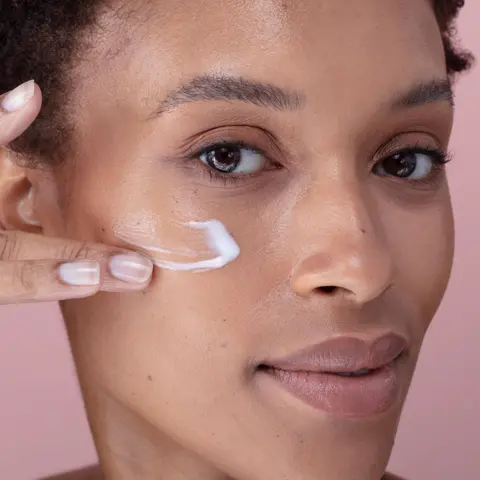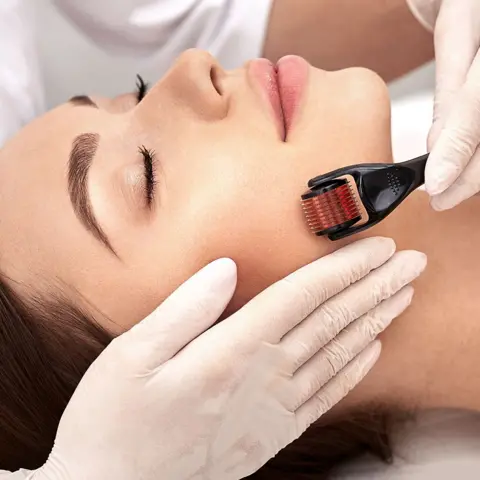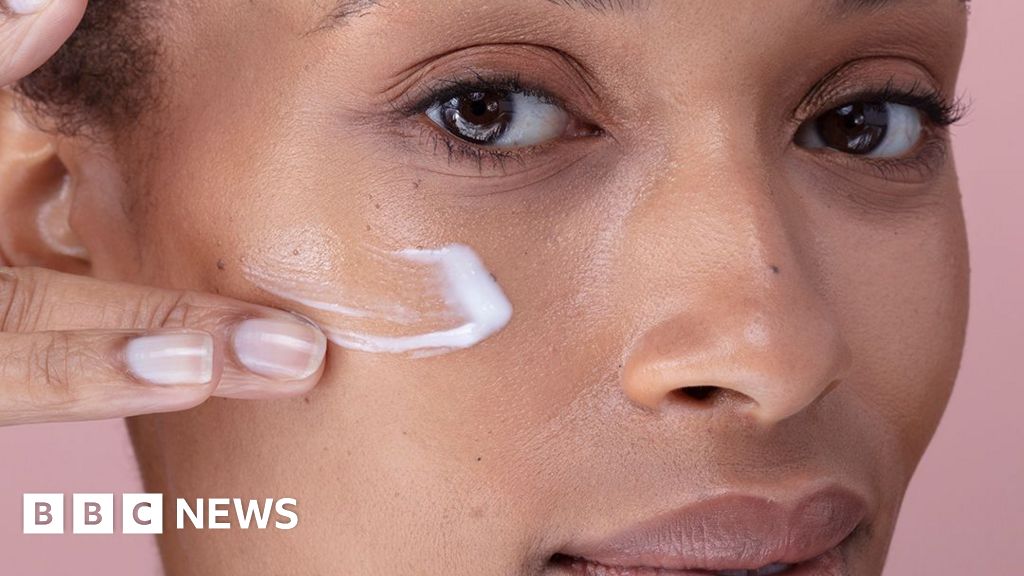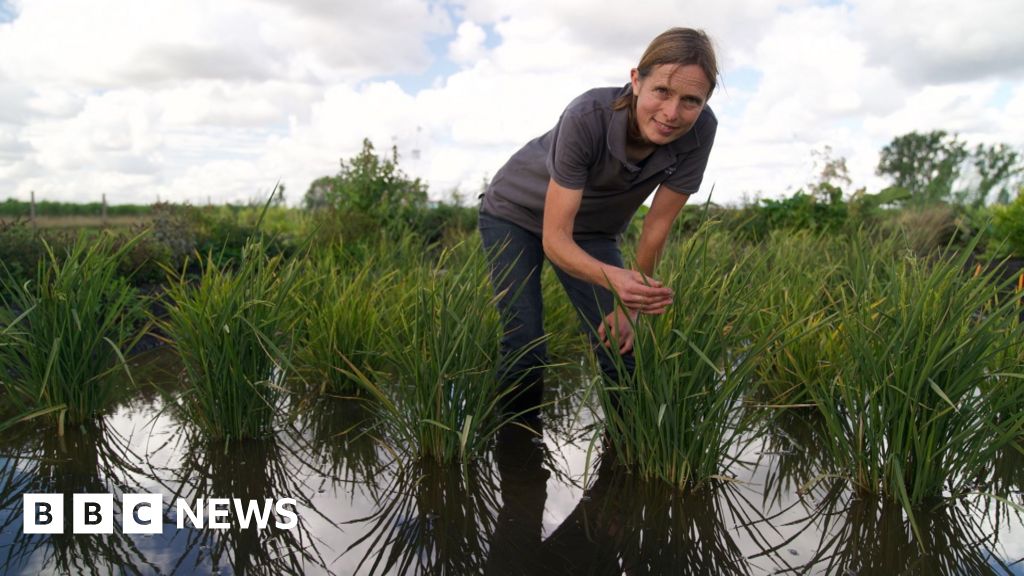Do collagen supplements work to reduce signs of skin ageing?
Ruth CleggHealth and wellbeing reporter
 Getty Images
Getty ImagesWhen it comes to collagen – how do you take yours?
There are parties where people even drink shots of the anti-ageing supplement, often followed by a hefty tequila – though the latter is probably not recommended in the quest for youthful, peachy skin.
Collagen is the most abundant protein in the body, and forms the scaffolding that helps maintain the structural integrity of our skin and musculoskeletal system.
In short, collagen helps to keep our skin plump, our joints and bones strong, and our hair and nails healthy.
It’s become so treasured that some dermatologists recommend “banking” it – investing in our collagen supply early so we have surplus when the inevitable happens.
Yes. The inevitable. Ageing. Sigh.
Our collagen supply naturally starts to decrease, on average around 1% a year, as we reach our mid to late 20s.
The speed of its decline depends on factors like our exposure to the sun, diet, and stress levels.
But is there credible science to say supplements can replenish our dwindling supply? And if so, what’s the best way of getting it into our bodies?
 Kimberlie Smith
Kimberlie SmithKimberlie Smith started taking collagen about six months ago. The 33-year-old began using it after a “traumatic year” in 2024. Her son was born prematurely, and as a result of stress, the mother-of-three says her skin took a “huge hit”.
She uses marine collagen, the type derived from fish, in a tropical-flavoured gel she drinks every day.
“My skin definitely seems to be brighter and clearer, plus my hair has never looked better since I started taking it,” Kimberlie says. “As a sleep deprived mother, it’s definitely made a difference.”
Emma Wedgeworth, a consultant dermatologist based on London’s Harley Street, says while there is some research to suggest taking collagen orally has an impact, she remains sceptical.
She says the idea that collagen can make its journey through our body – not the easiest of quests – and land exactly where we need it to be is probably wishful thinking.
For a start, it has to get through the gut without being completely broken down. Collagen is a large molecule so companies have now started to break it up into smaller pieces – collagen peptides – otherwise known as hydrolysed collagen.
Even though this collagen – now in its smaller form – has a better chance of making its way through the intestinal wall and into the bloodstream, it still has a long way to go.
It has to reach the skin to have an impact, and it could just as easily slip off to support other organs in the body. It’s a valuable resource.
“There is little reliable evidence on this, but there is a theory that because our skin is the organ with the ‘fastest turnover’ of cells, it might be more likely to use these collagen peptides above other organs.”
And that’s when you might get an increase in collagen being made in the skin cells.
‘You can’t risk stopping’
That all seems very complicated – and uncertain. It may leave you asking: what about using collagen creams? They’re going directly onto the skin, so won’t they stand more chance of getting where they need to be?
“No,” is Ms Wedgworth’s simple answer. “The collagen will just sit on the outer layer of your skin, it won’t reach the dermis – which is the middle layer.”
There are three different types of collagen supplements: marine (from fish), bovine (from cows), and vegan. Of the three, the dermatologist recommends marine if you are taking collagen orally.
This is because it contains more type 1 collagen – the most common of the five types and the one that gives structure to our skin cells, as well as playing a crucial role in the health of our bones, tendons and connective tissues.
Vegan collagen is the least effective, says Ms Wedgeworth. Collagen is an animal-derived protein, so these products are not actually made of collagen, and instead contain a range of amino acids and vitamins.
 Matthew Montgomery
Matthew Montgomery“I’m trapped,” Ali Watson tells me as she points to packs of bovine collagen powder in her kitchen. “Yes, this one is for me and well, this one is for Tommy.”
I look at the slender brown hound next me, grey whiskers poking out round his nose. He lifts an eyebrow in acknowledgement.
Ali, a neuroanaesthetist who, by her own admission, “knows a lot about dosing”, feels like now she’s started taking collagen, she can’t stop – and nor can she stop giving it to her dog.
“I started taking it as a powder a couple of years ago. At first, it wasn’t about my appearance, it was about my joints, I wanted to protect them because I do a lot of weight-lifting.”
Ali’s not sure that she’s noticed any difference with her joints, but she has noticed a change elsewhere.
“My skin feels like it glows more, my hair feels thicker and my nails feel stronger.”
I glance down at Tommy, who seems more interested in his dog bowl than any powdered supplements.
“I know, it seems mad,” Ali says, “but Tommy seemed a bit slower, a bit less enthusiastic just before summer, so I thought I would try him on dog collagen.
“I wanted to see if it could help with his joints – he’s getting old now. And he is a bit brighter, but that might just be because the weather’s got colder again and he’s less hot and lethargic.”
Ali’s not completely convinced the supplement is making a difference, and it’s costing her £60 a month to ensure she and Tommy get their daily dose.

But she says she now can’t stop dosing them both up. “That’s the thing with these supplements,” the 46-year-old says, “life does have its ups and downs. You might take them when you’re on a down, then things pick up again – and it might have very little to do with the supplements.
“But by that stage, you can’t risk stopping.”
Professor Faisal Ali, a consultant dermatologist at Mid Cheshire NHS Trust, says one of the issues consumers and clinicians face is the amount of conflicting information and conflicting interests in supplement research.
A recent, relatively small, study compared research funded by the wellness industry to studies that did not have the same conflict of interest.
While industry-funded studies suggested collagen supplements significantly improved skin hydration, elasticity and wrinkles, those that did not receive funding from pharmaceutical companies revealed no effect on skin.
Prof Ali says industry-funded studies are not “inherently bad”, it’s just such a varied picture. But he says there is a lack of robust evidence to suggest oral and topical collagen have any substantial effect.
So if I could turn back time and start drinking and banking collagen in my 20s, would I have smoother, more youthful skin now, I ask him? Probably not, he says. It doesn’t stay in the body for that long – we haven’t got a collagen store cupboard that we can just dip into.
 Getty Images
Getty ImagesHowever, Prof Ali believes we can potentially boost collagen output and maintain elasticity in our skin by using special techniques such as laser collagen stimulation and microneedling.
This means using a number of tiny, specialist needles or a laser to make small wounds to our skin, which then encourage a repair process, triggering new collagen formation.
But that’s not cheap. You could be paying up to £300 for one session. Is there a less costly alternative?
“The best thing you can do for your skin,” Prof Ali says, “is using decent sunblock. We know the sun has a huge impact on ageing our skin.
“Sun cream, healthy diet, and if you smoke, stop.
“These will have a far greater impact than collagen supplements.”
Share this content:





إرسال التعليق